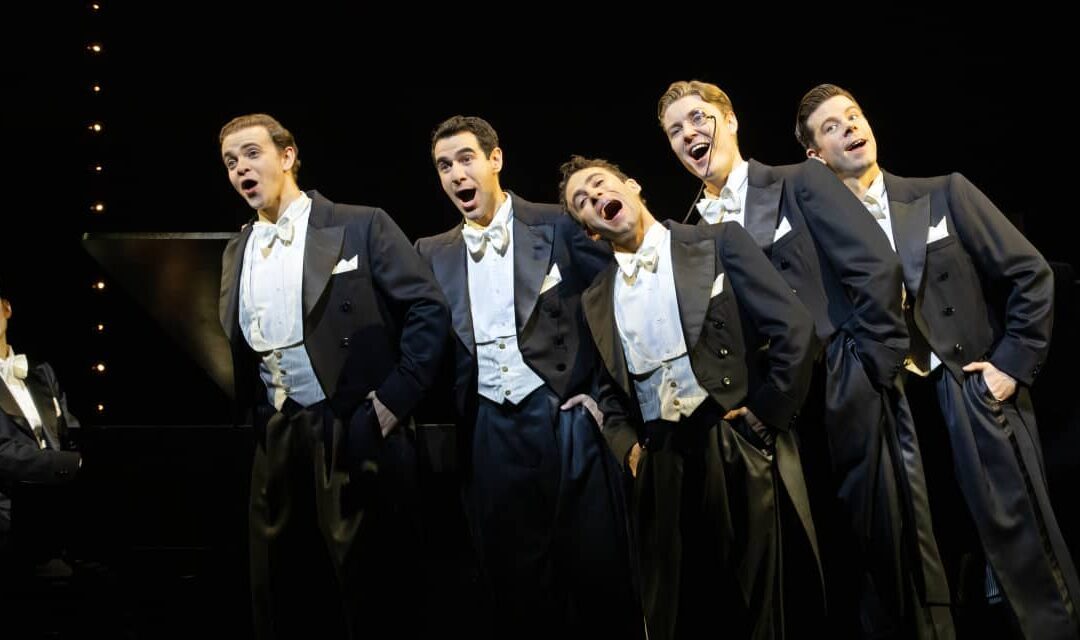For generations, Broadway fans have sought out prime seats for evening performances, firm in their conviction that a night out on the town is exactly that — an opportunity to celebrate the magic of theater, so long as it’s after sunset.
And the matinee crowd? That has tended to be senior-oriented, suburban and a bit more sedate, with a heavy concentration of women, according to theater historians.
But try telling that to Colin A. Weil, a 57-year-old real-estate professional who lives in Manhattan. He recently caught a Wednesday afternoon performance of the critically acclaimed revival of Stephen Sondheim’s “Merrily We Roll Along.” And he felt right at home.
“It’s not the ladies who lunch anymore,” says Weil, aptly quoting the title of a Sondheim song from another show, “Company” — whose lyrics reference women who attend matinees.
Weil is far from the only atypical matinee attendee these days. Based on recent ticket trends, it’s clear the cool crowd — or at least a portion of it — has turned 2 p.m. into the new 8 p.m. — or 7 p.m., since some shows have moved up their evening curtain times in keeping with this earlier-is-better shift.
As the Tony Award-nominated playwright Jeremy O. Harris recently posted on the social-media platform X: “Wednesday matinees aren’t just for senior citizens.”
Harris’s post featured a photo of a fashion-conscious matinee-goer, along with the observation that daytime performances are “fantastic options for well dressed young people with busy nights and time to spare after a quick business lunch.”
In a report released earlier in December, the Broadway League, the trade group that represents producers and theater owners, noted that the average age of Broadway attendees is now 40.4 years, the youngest it has been in two decades.
At the same time, TDF, a nonprofit organization that sells tickets for Broadway shows and other cultural events at a discount, says its matinee sales to members have increased at a higher rate than its evening sales in recent years.
“‘It’s not the ladies who lunch anymore.’”
It’s considered a positive sign for an industry that hasn’t fully regained the box-office success it enjoyed before the pandemic. That’s notwithstanding the fact that Broadway is heading into what is usually its busiest time — the week between Christmas and New Year’s Day. Not so incidentally, it’s also a time when many shows add extra matinees to their schedule.
The growing interest in afternoon performances has prompted Ken Davenport, a prominent producer, to upend the traditional Broadway arrangement of limiting matinees to Wednesdays, Saturdays and Sundays.
Davenport has offered a fourth matinee — on Thursdays —for his two current shows, the musicals “Harmony,” written in part by pop legend Barry Manilow, and “A Beautiful Noise,” which features the songs of Neil Diamond. The Thursday daytime performance replaces a Wednesday evening one that Davenport would have otherwise scheduled.
Davenport admits his audience skews more to the senior set than the crowd Harris describes, though the producer insists there are “hipsters in that [older] community” nonetheless. More to the point, Davenport says Broadway audiences in general are increasingly looking for the daytime option as part of a broader postpandemic shift.
“This is really a societal change of people wanting to be home and in their PJs before 10 p.m.,” he says.
A scene from the Broadway musical “A Beautiful Noise,” another show that has an expanded matinee schedule.
Photo: Julieta Cervantes
That is something that many matinee-goers willingly admit to.
“I can process better in the day,” says Jono Waks, a 55-year-old publicist who was attending a performance with Weil. “When I go at night, the chances of me dozing off might be greater.”
Some matinee attendees also say they like the idea of sneaking off during the day to catch a show, almost as if it’s a guilty pleasure. Rachel Weingarten, a marketing professional and veteran theatergoer who calls Brooklyn home, has an even racier way to describe the matinee experience.
“It’s like an afternoon delight, but you’re not going to worry about getting an STD,” she says.
Madison Pittman, a 27-year-old matinee devotee and Brooklynite by way of Kansas City, Kan., says attending a glitzy Broadway show on a Wednesday afternoon makes her feel like a true New Yorker.
“I never thought I’d have the ability to go see a quality production in the middle of my day,” she says.
As it turns out, the rest of the country may also be hopping on the matinee bandwagon. Afternoon performances are offered at theaters from coast to coast, with some theaters saying they are looking to expand their daytime lineup because of the demand.
The Ogonquit Playhouse, a theater in the Maine town of the same name, plans to add a Friday matinee during its next season, which runs from May to October. That’s on top of the afternoon performances it has previously offered on four other days during the week.
It’s all about giving audiences what they want, says Ogonquit managing director Deborah Warren, who notes that matinees have been selling at 90% to 100% capacity of late. Plus, some Maine afternoons, even in the height of summer, just lend themselves to being inside.
After all, it’s New England, Warren says. “We don’t always have sunny weather.”
Not every theater buff believes the afternoon scene has changed. Jennifer Baum, chief executive of a marketing agency and a longtime theatergoer, says she gave up on Broadway matinees several years ago when she saw patrons eating sandwiches during the middle of one show.
“It was one of the most distracting experiences we ever had,” recalls Baum, who doesn’t want to risk it again.
For the most part, actors welcome afternoon performances, especially on matinee days without a second show in the evening. They say they relish the opportunity to have their night free to catch up with friends, cook a proper meal or even do their laundry.
But there are also challenges. Chip Zien, a star of “Harmony,” says he has sometimes been stumped about when to eat on matinee days, since he doesn’t like having a big meal before a show. But if he doesn’t dine at all, he risks having hunger pangs by the second act and becoming a “loose cannon on stage.”
And like so many others in the theater world, the Tony-winning playwright and actor Harvey Fierstein says he’s a night person by nature. So it takes some effort and adjustment to spring into action for a matinee.
“It’s almost easier to do a midnight show,” says Fierstein.








